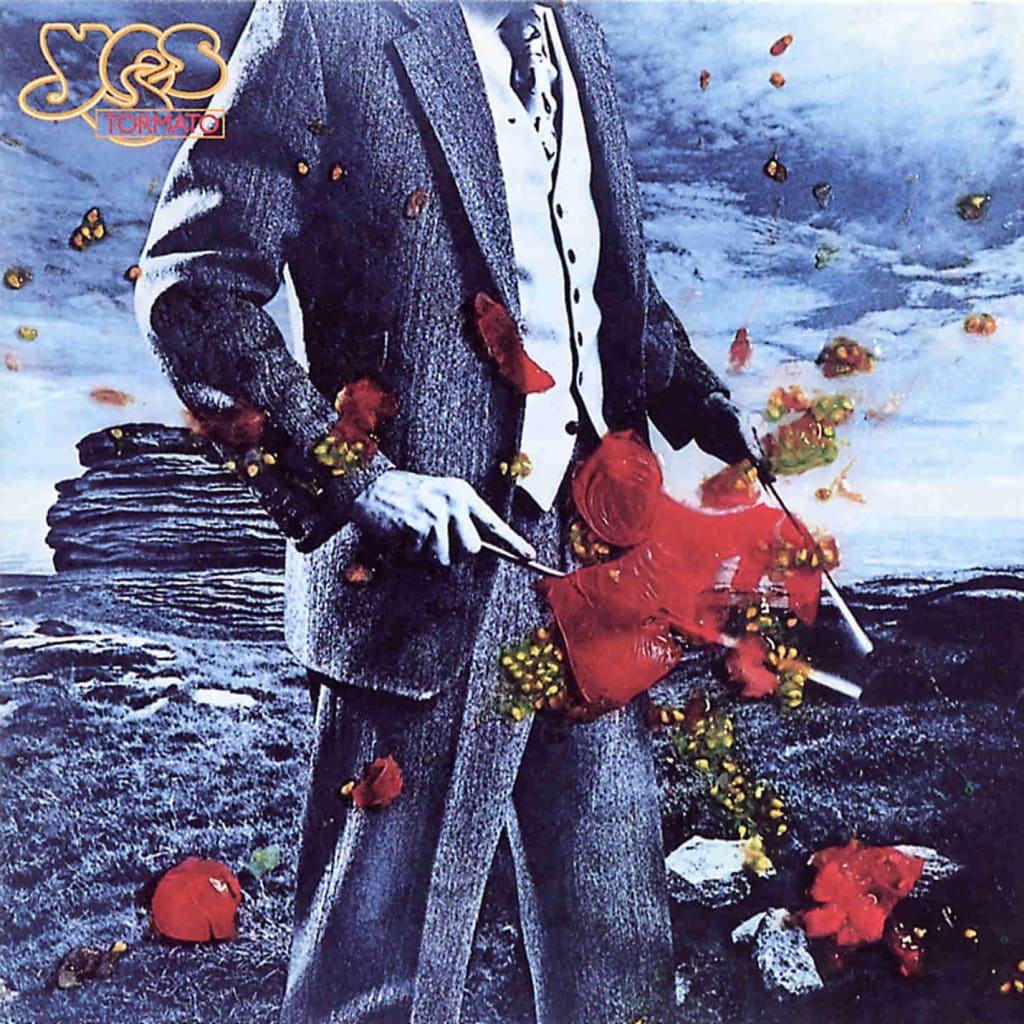'Tormato' - The Sum of Ten True Summers Long
Yes Playing with the Game of the Age

After touring for Going for the One, the Yes lineup of Jon Anderson (vocals), Steve Howe (guitar), Chris Squire (bass), Rick Wakeman (keyboard), and Alan White (drums) set out to record their next album. It was meant to be named after the peak, Yes Tor. There are different accounts of who actually decided to throw a tomato at the cover art, but whatever the case, it resulted in the album title changing to Tormato. Released ten years after Yes' formation, the album actually has eight tracks like their first two albums, Yes and Time and a Word. So it does feel a bit like coming full circle, which is appropriate given that the album was followed by a tour "in the round" on a rotating stage that included a 25-minute medley of Yes songs. Tormato was somewhat more eclectic than Going for the One, and listeners over the years have had mixed opinions on the album, especially when it comes to the mixing of it. Still, people are able to find what they love about Tormato.
1. "Future Times/Rejoice"
The first track, which is credited to the whole lineup, is split into two sections, the first of which is "Future Times." Wakeman's notes announce the album's start, and Squire has a nice bass presence. With the lyrics "Ever turning round and round," as well as "Pulsating round and round," we get this recurring theme that actually fits nicely with the idea of performing in the round.
With the song being about the future and the Tormato album having been made ten years after Yes' formation, one can listen to this as a song commemorating the first decade of Yes. "In the cities of the southern sky" brings "South Side of the Sky" from 1971's Fragile to mind, even if it's not intentional. After all that has been done in the past, Anderson reassures listeners that "Future times will stand and clearly see." The words "See it all" echo throughout the land, with White's drumsticks adding to the backdrop.
Despite the lyrics "Future times will stand and clearly smile," we are told that the Great Duke of Hell "Dantalion will ride again." But despite the evil that humanity may encounter, future times will still stand, the world prevailing rather than ending, it seems. The counting section actually makes for a nice buildup to the climax that ends this section.
Then we move into the next section, "Rejoice," which begins with, "Rejoice forward out this feeling / Ten true summers long," the latter verse having first appeared in "Roundabout." Could the white eagle be the same eagle mentioned in "Roundabout?" Whatever the case, this feels like another reminder of the ten years of Yes that preceded this album. Indeed, we are reminded of the passage of time:
Time flies, on and on it goes Thru the setting sun Carry round and round and round and round Until it comes to carry you home
These words fit well with the ideas of Tales from Topographic Oceans song "Ritual," which is about the sun and going home. The line "Dawns new light conquering timeless ease" may even bring side A of that album to mind. For the next album, Drama, Yes would go on to record "Tempus Fugit," which is also about how time flies. Also of note is that Wakeman has some really great bits on "Rejoice," with Squire's bass complementing him.
"Don't Kill the Whale" music video.
2. "Don't Kill the Whale"
"Don't Kill the Whale" is, as one would expect, a protest song, credited to Anderson and Squire. The punk rock feel of it really suits the title. Chris "The Fish" Squire's large bass presence is appropriate given that the song is related to sea creatures. Howe really shines after each stanza. And we get a callback to the first track via the verse "Rejoice they sing." And the theme of time comes up again: "If time will allow / We will judge all who came." White is heavy in the background, and Wakeman brings a sense of urgency toward the end. The way that "CETACEI" is sung is reminiscent of how "The Fish" ends with "Schindeleria praematurus."
After the Tormato Tour, "Don't Kill the Whale" was shelved from Yes' live repertoire for a while. In the 21st century, it gained a resurgence, being performed by this same lineup from 2002 to 2004. After that period, it was performed on tours from 2015 onward. (Pun not intended, even though it was performed after "Onward" in 2015.)
When "Don't Kill the Whale" was released as a single back in the day, it had "Abilene" as the B-side. This Howe-written song begins with the neighing of a horse, and it's followed by gentle music that feels very radio friendly. The words "But my phone just rang and I didn't get no call" feel a bit off for Yes, at least in this era. But "Abilene" is a good song. Given the tone of it, this might have been a good track to place before "Madrigal" if the LP length not been so limited.
"Madrigal" music video.
3. "Madrigal"
"Madrigal" was written by Anderson and Wakeman. The keyboardist performs elegantly on a Thomas Goff harpsichord, giving the song a baroque feel. Anderson sings "Of a golden age set in stone," which is interesting given that Yes would record "Golden Age" during the 1979 Paris sessions. (Wakeman would rework parts of that song for "Maybe '80" on his solo album Rock 'n' Roll Prophet.) Anderson sings, "Sacred ships do sail the seventh age," probably referring to the biblical Ages of the World.
He also sings, "Cast off your garments of fear, replace them with love," which is a clever way of saying that one should be brave. The lyrics "Celestial travelers have always been here with us" might bring "Astral Traveler" from Time and a Word to mind. Howe's guitar playing adds to the baroque atmosphere as ships sail.
After the Tormato Tour, "Madrigal" was not performed live again until the 2017 Yestival Tour. This iteration was a duet between Steve Howe and current Yes vocalist Jon Davison. Howe's guitar was an effective substitute for the harpsichord. A recording of one such performance is available on the new live album Yes: 50 Live.
4. "Release, Release"
"Release, Release," written by Anderson, Squire, and White, feels somewhat in the vein of "Going for the One." It is definitely a rock and roll song dominated by White, with Squire keeping up with him. Appropriately, the words "Rock is the medium of our generation" are sung. Singing the lyrics would be an interesting challenge given the speed, which is comparable to "Tempus Fugit" from the next album Drama. The challenge of playing it might be why "Release, Release" was only performed six times in 1978. Anderson takes a break from singing as the following verses are sung:
Lost and wondering, maybe, how it is Seems to me, it's as simple as this No matter, where you go, you're going to find You won't see me in front, but you can't leave me behind
To abandon hope for brothers and sisters seems like an odd suggestion. After all, a few members of this lineup would go on to play "Brother of Mine" on Anderson Bruford Wakeman Howe a decade later. White's drum solo is accompanied by a recording of a crowd cheering. In all honesty, the crowd does not need to be there. It might ruin the immersion given that this is not actually a live recording of the song. In fact, it feels a bit self-indulgent. But by that same token, the playing is impressive. The song overall is sure to give one a good energetic release.
5. "Arriving UFO"
"Arriving UFO," written by Anderson, Howe, and Wakeman, is probably the strangest song on the album. But isn't it fitting that this feels the most alien? The beginning brings to mind someone scanning for intelligent life. "I could not take it oh so seriously really" might feel fitting for the absurdity of this song. The theme of the future also returns: "Arriving through eons of times immortal power of the future to behold." The mention of ships might also bring the celestial travelers from "Madrigal" to mind: "In the ships we see / The coming of outer space." During Wakeman's bit after this, one might imagine someone tapping their feet and clapping their hands, or even do so themselves.
I am intrigued by the verses, "You say I'm a fool, a believer / Put your feet on the earth it is green." These, along with "Look out," remind me of "Looking Around" from the first album, which includes the lyrics, "Looking around with my feet on the ground." I am also reminded of the title track from Anderson's 1980 solo album Song of Seven, in which he sings, "I can hear you saying what a dreamer, what a fool to life / Isn't it a pity that he won't come back to earth?"
As the song heads to a close, one can imagine the UFO spinning around. There are sounds that remind me of a baby babbling, though it could also be alien or robot speak. An odd song indeed, and one that was performed at only ten Yes concerts in 1978. I've seen varied opinions on whether or not this song should have even been included on the album, but I enjoy it.
"Circus of Heaven" as seen on Live in Philadelphia 1979.
6. "Circus of Heaven"
The Anderson-written "Circus of Heaven" is another song I've seen varied opinions of, but I rather like its whimsical nature. The percussion that is used throughout adds to the fairy tale vibe of the song. Again, we are reminded of time, as well as Anderson's fixation with the number seven:
For what seemed only just a moment in time Seven solemn flying silvered regal horses rode by Seven golden chariots in tow, a wonder to behold The Seven Lords of the Mountains of time
In addition, we also get the line "Seventh Lord of the seventh age." Some might see this as repetition, some may call it alliteration that works. Given the vocabulary of the song, it might be more challenging to sing this song than "Release, Release" for some. Howe provides a mood that feels somewhat melancholic despite all the wondrous sights.
We then get Jon singing, "Was that something beautiful, amazing, wonderful, extraordinary beautiful?" And then his son Damian responds, "Oh! it was OK!! But there were no clowns, no tigers, lions or bears, candy-floss, toffee apples, no clowns." This is a bit of a down note, and yet the closing music feels very joyous. Some sources claim that Tormato was released on September 22, 1978. If that's the case, then it may have been released on Damian's sixth birthday.
7. "Onward"
"Onward" has orchestral arrangements from Andrew Pryce Jackman, who worked with Squire in The Syn and on his solo album Fish Out of Water. Even though it is Anderson who sings "Proclaimed in everything I write," it is Squire who wrote this song. When Squire does get to sing, he delivers. It is rather sweet to compare someone to a light that guides one in the darkness of the night. There is such a sincerity to the continued proclamation "Onward through the night of my life."
"Onward" was not performed live until the three San Luis Obispo shows in 1996. As one can hear on Keys to Ascension, Howe added the beautiful "Unity" intro, which enhanced the romantic feeling of the song. After those shows, "Onward" was not performed live again until the 2008 In the Present Tour, and it got more live play in the subsequent two years.
In 2015, Squire passed away, and the Yes shows that followed opened with a tribute to him. His Rickenbacker was in the spotlight, and the Tormato recording of "Onward" was played against a slideshow containing pictures of Chris throughout his history with Yes. It was a touching tribute among the most beautiful moments in Yes history. More recently, Yes performed "Onward" on The Royal Affair Tour and dedicated it to Chris. What a beautiful track that he added to the Yes catalog.
"On the Silent Wings of Freedom." Oddly, this was not included on the music video compilation Greatest Video Hits.
8. "On the Silent Wings of Freedom"
After the gentle conclusion of "Onward," the abrupt opening of "On the Silent Wings of Freedom" may take one by surprise. This song is credited to Anderson and Squire. The latter is at peak form on his bass here, and White, again, works very well with him. We get familiar wording via the verses "On the winds of celestial seasons" and "We only know we go around and around."
When the music eventually calms down, one can hear a bell. The struggles that some may experience during single life is brought up: "On the darkest night so painful / Do you hunger for love midst the torture of being one." And then we are back on the quick pace of the song. Wakeman lets loose in his flamboyant fashion. With the complexities of this song, it is no wonder that fans have long wanted it to be performed live again. The bass riff of it has been performed by Squire on occasion, but the song has not been played in full since 1979.
"You Can Be Saved" bonus track.
Conclusion
It is evident that Yes came up material ranging across different styles during the Tormato sessions. A sizable amount of songs did not make it to the album. The song "Richard," which is about Richard the Lionheart, mentions that he "set to sail the seven seas." So this might have fit well after "Madrigal" if the LP limitations were not in place. It was eventually released on In a Word: Yes in 2002. And over the years, Anderson has reworked the song in his solo works. He reused a melody for "Time Has Come," as heard on The Mother's Day Concert (recorded 1996) and Earthmotherearth (released 1997). He also performed "Richard" with altered lyrics in the 2000s, as heard on Binaural in Boston (recorded 2005) and Live from La La Land (recorded 2006).
Another song that would have been a good addition to the album is "You Can Be Saved." Written by Squire, it features a strong vocal presence from him. It was eventually released on the 2004 Rhino reissue of Tormato, but is such a beautiful song that might have been great to have had directly after "Onward." "Money," on the other hand, is a very odd song, with such simple lyrics as "Money high, money low / Money come, money go." Wakeman does a voice-over pretending to be Dennis Healey, Labour Chancellor of the Exchequer, known for his policies of high taxation rates for the wealthy. This song was eventually released on the 1991 box set YesYears, and then the 2004 Rhino reissue of Tormato.
Bonus tracks on that reissue reveal more songs that Yes worked on, and later repurposed for other projects. Steve Howe would reuse notes of "High" for "Sketches in the Sun," which he would perform with Asia and GTR. He would also rework "Countryside" as the instrumental "Corkscrew" for his 1991 album Turbulence. Another version titled "Resistance Day" would turn up on an archival collection titled Homebrew 2 in 2000.
Jon Anderson would rework "Picasso" for a set of demos (later bootlegged) in the mid-1980s for a musical titled Chagall. While that musical has not come to fruition, Anderson has expressed optimism that this project, along with other unfinished ones, will be completed at some point. He also recycled "Some Are Born" and "Days" for his solo album Song of Seven.
But of course, this solo album would come after the 1979 Paris sessions that would result in not just his departure from Yes, but Rick Wakeman's as well. Working with Roy Thomas Baker during those sessions brought about songs such as "Tango," "Never Done Before," "Golden Age," "In the Tower," and "Friend of a Friend." These could have been developed further, but Anderson and Wakeman were not feeling that the band was going in a direction worth pursuing. They would leave Yes, but they would be back.
Some might cite Tormato as a sign that the band members each wanted to go in different directions. I see it as evidence that they were full of many interesting ideas, some better than others. As it is, I believe that Tormato has really great material compared to some of the less developed songs that have resurfaced as bonus tracks over the years. People can go round and round debating the musical merits of Tormato. But in the end, it comes with sound that I believe is worth hearing.
About the Creator
Steven Shinder
Author of fantasy horror comedy novel Lemons Loom Like Rain, which is available on Amazon. You can also read excerpts at stevenshinder.com and check out facebook.com/StevenShinderStorytelling.






Comments
There are no comments for this story
Be the first to respond and start the conversation.